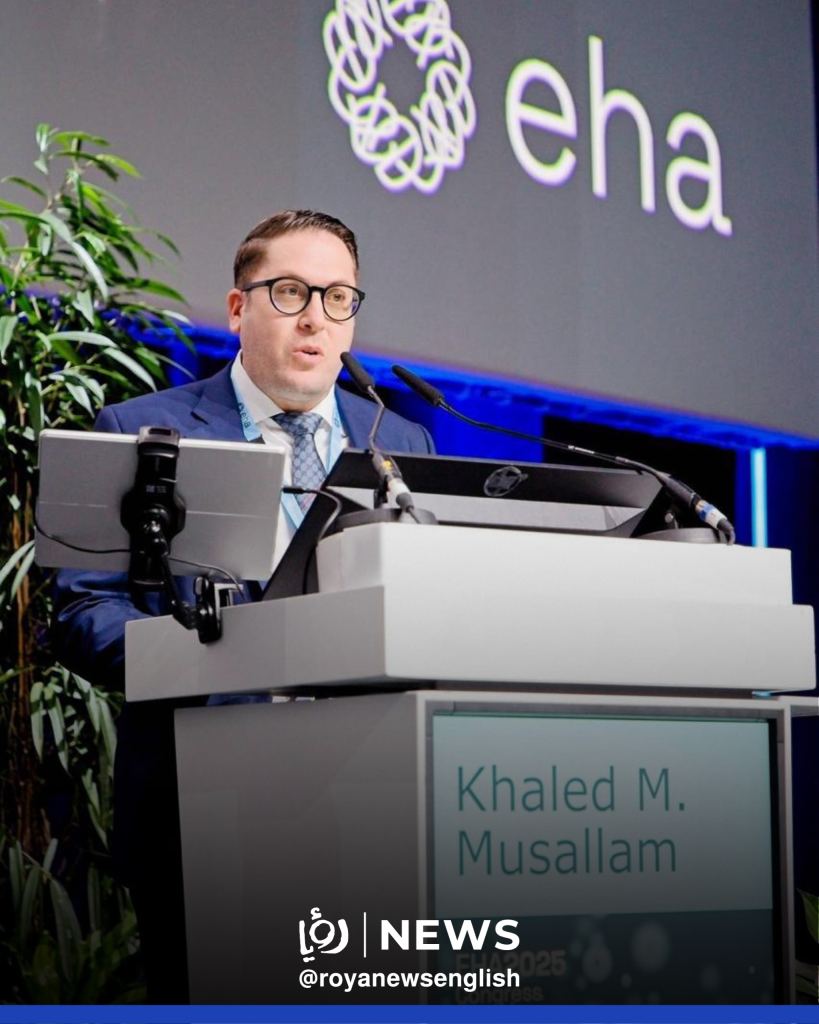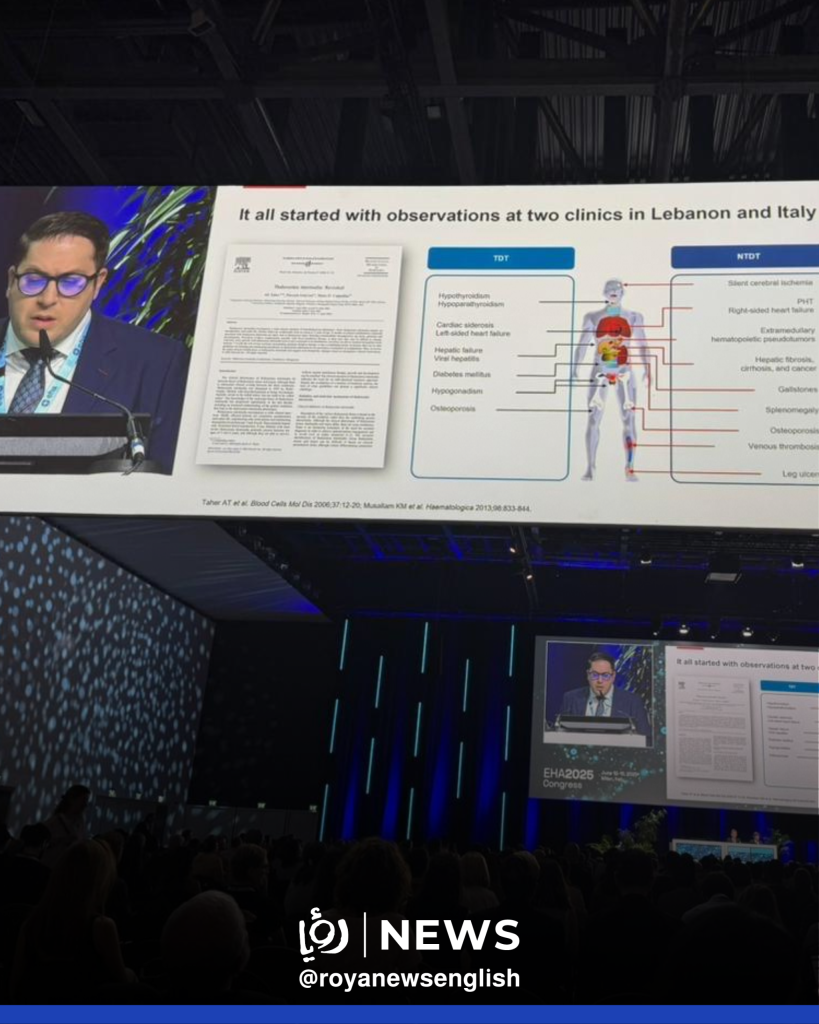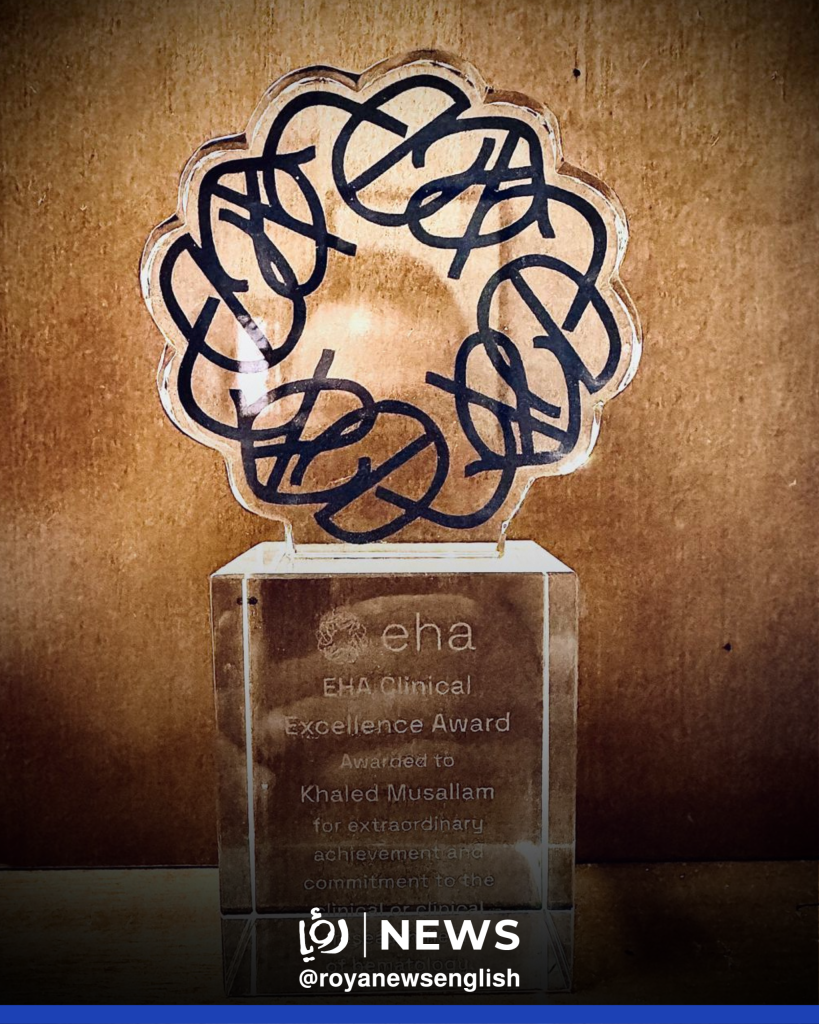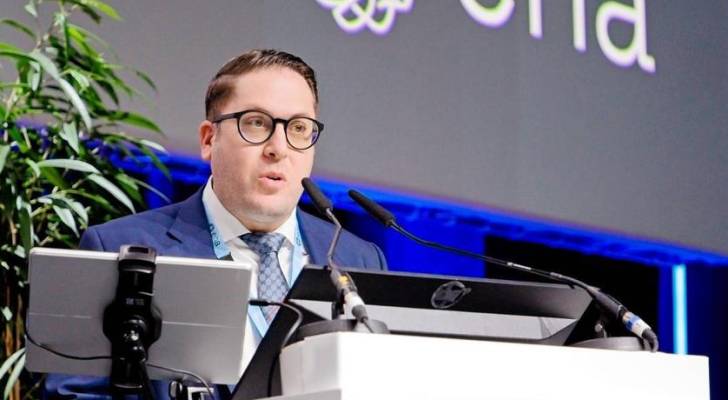Professor Khaled Musallam accepts his award on June 12, 2025
Jordanian Professor Khaled Musallam, first Arab to win EHA's prestigious Clinical Excellence Award
Professor Khaled Musallam, a Jordanian physician and world-renowned researcher based in Abu Dhabi won the 2025 Clinical Excellence Award of the European Hematology Association (EHA), delivered to him on June 12 during the Opening Ceremony of the association’s annual congress held in Milan, Italy, making him the first Arab to win this award.
EHA is one of the largest hematology organizations in the world, promoting excellence in patient care, research, and education. Prof. Musallam was awarded for his extraordinary achievements and commitment to clinical research, with valuable contributions and pioneering work in the field.

Prof. Musallam is currently Group Chief Research Officer (Burjeel Holdings) based at Burjeel Medical City in Abu Dhabi as well as the Founding Director of the Center for Research on Rare Blood Disorders (CR-RBD), Director of the Thalassemia & Sickle Cell Center, and Head of the Innovative Trials Unit at the Genetics and Rare Disease Center. He is also Global Research Lead at Burjeel Institute for Global Health in New York and Adjunct Professor at both Khalifa University in Abu Dhabi and Weill Cornell Medicine in New York.
Prof. Musallam’s passion for research and evidence generation started when he was a medical student at the American University of Beirut (AUB), when he started realizing the impact of clinical research on advances in patient management, especially when it comes to rare diseases that have a high burden in the region. He had already become an established researcher before even graduating from medical school, focusing his scientific inquiry on thalassemia – a genetic blood disorder characterized by chronic severe anemia - while working under the mentorship of Prof. Ali Taher. He then embarked on a rapidly rising career in both academia and the industry across multiple organizations in Europe and the Middle East.
Prof. Musallam’s secret recipe for success was to foster extensive collaborations both regionally and globally and to use the power of observation to inform novel drug development. His work has mainly focused on setting up and leading large global datasets of patients with thalassemia to identify relationships between modifiable risk factors and long-term morbidity and mortality outcomes, which can be targeted by treatment optimization or novel therapies.
Through a series of large observational studies, Prof. Musallam’s work helped characterize the various forms of thalassemia with respect to transfusion dependence, leading to a shift in patient categorization globally. His work opened the eyes of the medical community to the detrimental effects of untreated anemia in non-transfusion-dependent patients (NTDT), including serious complications and early death, and unfolded the unmet need that was the basis for the development of two novel disease-modifying therapies, luspatercept and mitapivat, the first ever to target the underlying disease in these patients - evaluated in global clinical trials with extensive involvement from Prof. Musallam as a principal investigator, steering committee member, and key advisor for regulatory filing with the US Food and Drug Administration (FDA) and the European Medicines Agency (EMA).

Prof. Musallam’s studies were also the first to provide clinical proof of principle on the association between iron overload and serious clinical complications in NTDT, almost affecting all organ systems. He identified thresholds which were later used to inform the design of oral iron chelation therapy (drugs that remove excess iron from the body) trials in NTDT and to define prescribing information and international management guideline recommendations for these agents. Collectively, his work provided a new treatment landscape and hope for NTDT patients by uncovering these detrimental risk factors for poor patient outcomes and supporting the development of novel agents that address them. Prof. Musallam has also made various practice-changing contributions to advance knowledge in transfusion-dependent patients (TDT) that also helped quantify the risk of suboptimal treatment and its impact on patient survival. His studies linking natural increases in fetal hemoglobin level and favorable patient outcomes, supported clinical proof of principle for advances in gene editing which recently turned from a dream to a reality.
Prof. Musallam is a highly respected author with over 230 publications in leading peer-reviewed international medical journals, with expert contributions that remain amongst the most recognized and cited in the field. He is also the Editor of the first ever NTDT management guidelines by the Thalassaemia International Federation and the newest TDT management guidelines, which are the prime resources used by treating physicians worldwide for patient care.
“I don’t consider this award as just a recognition of my contributions to the field, it’s a celebration of all the successful collaborations I had throughout my career, especially with mentors and mentees that eventually became close colleagues and friends from all over the world. We were all joined by a single cause of improving the lives of patients living with a devastating disease. The support and resources made available to me in the UAE over the past 5 years have surely helped accelerate my research programs and allowed me to put our region on the international map of research and development. There are several challenges that continue to persist and need addressing but with recognition of all the hard work we do such as this one from EHA, we are fully energized to keep the momentum for advancing knowledge and discovering new treatment options,” said Prof. Musallam.





